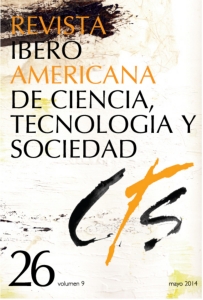Andrew Feenberg’s philosophy of technology and democracy as an emergence from Herbert Marcuse’s critical theory for the XXI Century
DOI:
https://doi.org/10.52712/issn.1850-0013-595Keywords:
critical theory, technology, politics, democracyAbstract
This article presents Andrew Feenberg, who outlined -for the XXI Century- Herbert Marcuse’s proposal of considering the inseparable link between science, technology and politics under the framework of democracy. Feenberg has continued Marcuse’s work on the bond between science and politics and between technology and ideology. This American thinker asserts that the Marcusean philosophy of technology constitutes a radical sociology of technology that allows us to narrow the gap between essentialist and abstract theories such as Heidegger’s and the frequently uncritical social studies of science. He postulates a connection -utopic, but possible- between democracy and technology, making an important contribution to the search for the democratization of the technological development that prioritizes its political dimension over its ontological one, and the pursuit of a radical transformation of technological goals towards fairer societies.
Downloads
References
FEENBERG, A. (1999): Questioning Technology, New York, Routledge.
FEENBERG, A. (2005): Heidegger and Marcuse: The Catastrophe and Redemption of History, New York, Routledge.
FEENBERG, A. (2005): “Teoría crítica de la tecnología”, Revista Iberoamericana de Ciencia, Tecnología y Sociedad- CTS, vol. 2, n° 5, pp. 109-123.
FISCHETTI, N. (2013): “Un caleidoscopio-gran ola. Dialéctica de la racionalidad tecnológica en la obra de Herbert Marcuse”, Revista Estudios. Filosofía práctica e historia de las ideas, año 13, n° 14. Mendoza.
FISCHETTI, N. (2011): “Técnica, tecnología, tecnocracia. Teoría crítica de la racionalidad tecnológica como fundamento de las sociedades del siglo XX”, Dossier Derivas de la tecnología. Revista Iberoamericana de Ciencia, Tecnología y Sociedad- CTS, vol. 7, n° 19. ISSN 1850-0013
GARCIA DE LA HUERTA, M. (2007): “Relectura ‘política’ de la cuestión de la técnica”, en E. Sabrovsky (coord.): La técnica en Heidegger, tomo 2, Santiago de Chile, Diego Portales.
HABERMAS, J. (1984) [1968]: Ciencia y técnica como “ideología”, Madrid, Tecnos.
HEIDEGGER, M. (1985) [1953]: “La pregunta por la técnica”, Época de la filosofía, Barcelona, pp. 7-29.
KELLNER, D. (1984): Herbert Marcuse and the Crisis of Marxism, California, University of California Press.
MARCUSE, H. (1969): El hombre unidimensional. Ensayo sobre la Ideología de la Sociedad Industrial Avanzada, México, Joaquín Mortiz.
MARCUSE, H. (1986a) [1959]: Ensayos sobre política y cultura, Barcelona, Planeta Agostini.
MARCUSE, H. (1986b) [1967]: El final de la utopía, Barcelona, Planeta Agostini. Trad. Manuel Sacristán.
MARCUSE, H. [1962]: “Acerca del problema de la ideología en la sociedad industrial altamente desarrollada”, en K. Lenk (2000): El concepto de ideología, Buenos Aires, Amorrortu.
PARENTE, D. (2010): “La tecnología como expresión material de la conflicitividad social. Sobre la filosofía de Andrew Feenberg”, en R. Conti y H. Solari (comp.): Violencia y conflicto en el pensamiento contemporáneo, Buenos Aires, Las cuarenta.
SHAPIRO, J. (1974): “La dialéctica de la teoría y la práctica en la era de la racionalidad tecnológica: Herbert Marcuse y Jürgen Habermas”, en B. Ollman y otros: Marx, Reich y Marcuse, Buenos Aires, Paidós.
ZIMMERMAN, M. (2007): “Esteticismo ontológico: Heidegger, Jünger y el nacionalsocialismo”, en E. Sabrovsky (coord.): La técnica en Heidegger, Tomo 2, Santiago de Chile, Diego Portales.
Downloads
Published
How to Cite
Issue
Section
License
Copyright (c) 2024 CC Attribution 4.0

This work is licensed under a Creative Commons Attribution 4.0 International License.
All CTS's issues and academic articles are under a CC-BY license.
Since 2007, CTS has provided open and free access to all its contents, including the complete archive of its quarterly edition and the different products presented in its electronic platform. This decision is based on the belief that offering free access to published materials helps to build a greater and better exchange of knowledge.
In turn, for the quarterly edition, CTS allows institutional and thematic repositories, as well as personal web pages, to self-archive articles in their post-print or editorial version, immediately after the publication of the final version of each issue and under the condition that a link to the original source will be incorporated into the self-archive.











